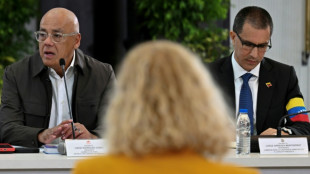
-
 Famine spreading in Sudan's Darfur, UN-backed experts warn
Famine spreading in Sudan's Darfur, UN-backed experts warn
-
2026 Winter Olympics flame arrives in Milan

-
 Congo-Brazzaville's veteran president declares re-election run
Congo-Brazzaville's veteran president declares re-election run
-
Olympic snowboard star Chloe Kim proud to represent 'diverse' USA

-
 Iran filmmaker Panahi fears Iranians' interests will be 'sacrificed' in US talks
Iran filmmaker Panahi fears Iranians' interests will be 'sacrificed' in US talks
-
Leicester at risk of relegation after six-point deduction

-
 Deadly storm sparks floods in Spain, raises calls to postpone Portugal vote
Deadly storm sparks floods in Spain, raises calls to postpone Portugal vote
-
Trump urges new nuclear treaty after Russia agreement ends

-
 'Burned in their houses': Nigerians recount horror of massacre
'Burned in their houses': Nigerians recount horror of massacre
-
Carney scraps Canada EV sales mandate, affirms auto sector's future is electric

-
 Emotional reunions, dashed hopes as Ukraine soldiers released
Emotional reunions, dashed hopes as Ukraine soldiers released
-
Bad Bunny promises to bring Puerto Rican culture to Super Bowl

-
 Venezuela amnesty bill excludes gross rights abuses under Chavez, Maduro
Venezuela amnesty bill excludes gross rights abuses under Chavez, Maduro
-
Lower pollution during Covid boosted methane: study

-
 Doping chiefs vow to look into Olympic ski jumping 'penis injection' claims
Doping chiefs vow to look into Olympic ski jumping 'penis injection' claims
-
England's Feyi-Waboso in injury scare ahead of Six Nations opener

-
 EU defends Spain after Telegram founder criticism
EU defends Spain after Telegram founder criticism
-
Novo Nordisk vows legal action to protect Wegovy pill

-
 Swiss rivalry is fun -- until Games start, says Odermatt
Swiss rivalry is fun -- until Games start, says Odermatt
-
Canadian snowboarder McMorris eyes slopestyle after crash at Olympics

-
 Deadly storm sparks floods in Spain, disrupts Portugal vote
Deadly storm sparks floods in Spain, disrupts Portugal vote
-
Ukrainian flag bearer proud to show his country is still standing

-
 Carney scraps Canada EV sales mandate
Carney scraps Canada EV sales mandate
-
Morocco says evacuated 140,000 people due to severe weather

-
 Spurs boss Frank says Romero outburst 'dealt with internally'
Spurs boss Frank says Romero outburst 'dealt with internally'
-
Giannis suitors make deals as NBA trade deadline nears

-
 Carrick stresses significance of Munich air disaster to Man Utd history
Carrick stresses significance of Munich air disaster to Man Utd history
-
Record January window for transfers despite drop in spending

-
 'Burned inside their houses': Nigerians recount horror of massacre
'Burned inside their houses': Nigerians recount horror of massacre
-
Iran, US prepare for Oman talks after deadly protest crackdown

-
 Winter Olympics opening ceremony nears as virus disrupts ice hockey
Winter Olympics opening ceremony nears as virus disrupts ice hockey
-
Mining giant Rio Tinto abandons Glencore merger bid

-
 Davos forum opens probe into CEO Brende's Epstein links
Davos forum opens probe into CEO Brende's Epstein links
-
ECB warns of stronger euro impact, holds rates

-
 Famine spreading in Sudan's Darfur, warn UN-backed experts
Famine spreading in Sudan's Darfur, warn UN-backed experts
-
Lights back on in eastern Cuba after widespread blackout

-
 Russia, US agree to resume military contacts at Ukraine talks
Russia, US agree to resume military contacts at Ukraine talks
-
Greece aims to cut queues at ancient sites with new portal

-
 No time frame to get Palmer in 'perfect' shape - Rosenior
No time frame to get Palmer in 'perfect' shape - Rosenior
-
Stocks fall as tech valuation fears stoke volatility

-
 US Olympic body backs LA28 leadership amid Wasserman scandal
US Olympic body backs LA28 leadership amid Wasserman scandal
-
Gnabry extends Bayern Munich deal until 2028

-
 England captain Stokes suffers facial injury after being hit by ball
England captain Stokes suffers facial injury after being hit by ball
-
Italy captain Lamaro amongst trio set for 50th caps against Scotland

-
 Piastri plays down McLaren rivalry with champion Norris
Piastri plays down McLaren rivalry with champion Norris
-
ECB holds interest rates as strong euro causes jitters

-
 Spain, Portugal face floods and chaos after deadly new storm
Spain, Portugal face floods and chaos after deadly new storm
-
EU close to sealing trade deal with Australia

-
 German Cup final to stay in Berlin until 2030
German Cup final to stay in Berlin until 2030
-
What does Iran want from talks with the US?

| SCS | 0.12% | 16.14 | $ | |
| RBGPF | 0.12% | 82.5 | $ | |
| CMSC | 0.08% | 23.539 | $ | |
| CMSD | 0.13% | 23.9 | $ | |
| RIO | -5.88% | 91.12 | $ | |
| BTI | 0.55% | 61.97 | $ | |
| RYCEF | -0.36% | 16.62 | $ | |
| GSK | 3.26% | 59.16 | $ | |
| NGG | -1.02% | 86.9 | $ | |
| BCE | -2.99% | 25.575 | $ | |
| BCC | -1.33% | 89.05 | $ | |
| RELX | 1.06% | 30.1 | $ | |
| VOD | -7.46% | 14.62 | $ | |
| BP | -2.7% | 38.17 | $ | |
| AZN | -0.14% | 187.19 | $ | |
| JRI | -1.47% | 12.96 | $ |

Trees could cut urban heatwave mortality by a third: study
Planting more trees in urban areas to lower summertime temperatures could decrease deaths directly linked to hot weather and heatwaves by a third, researchers said Wednesday.
Modelling found that increasing tree cover to 30 percent would shave off 0.4 degrees Celsius (0.7 degrees Fahrenheit) locally, on average, during hot summer months, they reported in The Lancet.
Of the 6,700 premature deaths attributed to higher temperatures in 93 European cities during 2015, one third could have been prevented, according to the findings.
Currently, just under 15 percent of urban environments in Europe, on average, are covered by some kind of foliage.
The study is the first to project the number of premature deaths due to higher temperatures in cities that could be prevented by additional tree cover, said lead author Tamar Iungman, a researcher at the Barcelona Institute for Global Health.
"We already know that high temperatures in urban environments are associated with negative health outcomes, such as cardiorespiratory failure, hospital admission, and premature death," he said in a statement.
"Our goal is to inform local policy and decision-makers about the benefits of strategically integrating green infrastructure into urban planning in order to promote more sustainable, resilient and healthy urban environments."
Cities record higher temperatures than surrounding suburbs or countryside due to the so-called urban heat island effect.
This extra heat is caused primarily by a lack of vegetation, exhaust from air conditioning systems, along with dark-hued asphalt and building materials that absorb and trap warmth.
Climate change has already amplified the problem. Last year, Europe saw its hottest summer on record, and second warmest year.
- Health benefits -
Heatwaves around the world are seeing record-breaking peaks, and have increased in duration in recent decades.
Today, cold conditions still cause more deaths in Europe than hot weather. But climate models project that heat-related illness and death will present a bigger burden to health services within a decade.
"This is becoming increasingly urgent as Europe experiences more extreme temperature fluctuations caused by climate change," said Iungman.
The researchers estimated mortality rates for people over 20 years old between June and August 2015, accounting for 57 million inhabitants in total.
This data was analysed in relation to daily average city temperatures in two modelling scenarios.
The first compared the city temperature with and without urban heat islands. The second simulating temperature reduction if tree cover was increased to 30 percent.
On average, the temperature in cities was 1.5C warmer during summer 2015 than in the surrounding countryside. The city with the highest difference -- 4.1C -- was Cluj-Napoca, Romania.
Across all cities, 75 percent of the total population lived in areas at least one degree warmer, while 20 percent experienced temperatures at least two degrees higher.
Overall, cities with highest temperature-elated mortality rates were in southern and eastern Europe.
"This is an important piece of research," commented Laurence Wainwright, a lecturer at the University of Oxford's Smith School of Enterprise and the Environment.
"Urban tree planting -– on the right scale, in the right places, and under certain other conditions -– likely leads to a modest-yet-real reduction in heat-related deaths in many urban areas."
Earlier studies have shown that green spaces can have additional health benefits such as reducing cardiovascular disease, dementia and poor mental health, as well as improving cognitive functioning of children and the elderly.
A.Suleiman--SF-PST



